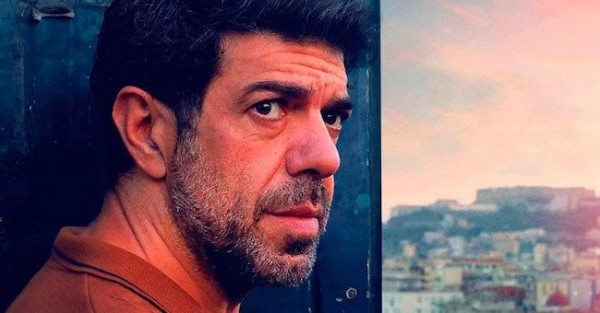-
NOSTALGIA (Mario Martone 2022)
MARIO MARTONE: NOSTALGIA (2022)

PIERFRANCESCO FAVINO IN NOSTALGIA
You can't go home again
Ermanno Rea’s last novel, published posthumously in 2016, has been brought to life on film here in a feature starring Pierfrancesco Favino, who played Tommaso Buscetta in Marco Bellocchio's 2019 Mafia "pentito" epic Il Traditore or The Traitor. This is smaller stuff in comparison, but still a haunting portrait of the filmmaker's native Naples with a blunt, shocking end, and an opportunity for Favino to be charismatic and mysterious as a man who returns to his home town, which he left at age fifteen, after forty years. This is almost like a fable, or an illustration of Thomas Wolfe's title, You Can't Go Home Again. A few of the details are a little hollow, but the whole thing is still resonant.
We first see Felice Lasco (Favino) arriving on an Egyptian plane where he is addressed in Arabic by the flight attendant, coming back to Naples for the first time after forty years abroad, to find his little, agèd mamma (the tiny but tremendous Aurora Quattrocchi), almost blind, to have a late-life reunion. There is an unforgettable scene where he carries her into a tomblike room and tenderly bathes her.
Strangely, since he has a beautiful Egyptian wife (Sofia Essaïdi) in Cairo (but no children), Felice turns out later to be planning to move back to the place he left as a teenager. Wealthy now, he immediately buys a nice apartment for his mum to replace the tiny flat a relative has moved her to, selling the nice one on an upper floor he grew up in.
This isn't the only questionable stuff that's been going on. Well, it's Naples, and not only that, but his native Sanità district, where the Catacombs are, near Capodimonte, is dominated or terrorized by what was Felice's best pal, Oreste Spasiano (Tommaso Ragno), now a crime boss known as O malommo ("The Bad Man"). As youths they carried out petty crimes together, and a murder is why young Felice left never to return. A few flashbacks in Super8 format bring back those early days and the young Feli' and Ore' (Emanuele Palumbo and Artem) in the smaller format, sunnier and brighter but with one horrible trauma.
He connects now with a priest known as Don Luigi (Francesco Di Leva), based on a real person (don Antonio Loffredo) who's like a social worker helping protect youth from crime and danger and involved with a youth orchestra and also a boxing gym. When Felice reveals his connection to Oreste aka O malommo, everyone tells him to go back to where he came from, including Raffaele (Nello Mascia), an older man who knew him whom he doesn't remember. Nonetheless against warnings, after the abrupt death of his mother, he is drawn back to his old friend, whose empire seems in decline and perhaps his health. Handsome but seedy O malommo, with his long white hair and beard, seems like an animal who is more dangerous because he is wounded.
This is tasty material, and not much has to happen because the situation becomes so constantly ominous and the city, nicely brought to life here by dp Paolo Carnera, is the other main character, beautiful, cozy (rather like Cairo but with more ornate, baroque architectural decoration), friendly, and full of menace. It's not implausible even though he's rich and happy and fluent in Arabic that a man might feel his native Napoli calling, still it's a little hard under these special circumstances to understand how Felice, who's had an apartment vandalized and a motorbike burnt to a crisp, would be so foolish, or for that matter why his pretty Cairene wife Arlette would be so into joining him to live in Naples now.
It's a dark and pretty story, a little like one by Paul Bowles. A fine return to contemporary drama for Mario Martone and another feather in the cap of the estimable and sympathetic Pierfrancesco Favino, playing the returning traveler of legend, a mystery man who's been gone so long he's forgotten the Italian word for sponge (spugno) and seems to have converted to Islam. Not perfect certainly, but great stuff nonetheless, this atmospheric film is two hours yet it feels as compact as it is tense, and there is not much fat on its bones. A good advertisement for the novels of Ermanno Rea. Recommended.
Nostalgia, 117 mins., debuted at Cannes in Competition May 2022, eight other festival showrings listed on IMDb. Breaking Glass Films has US distribution rights: in theaters from Jan. 20, 2023, VOD and on digital Feb. 21. Metacritic rating: 76%.
Last edited by Chris Knipp; 05-09-2023 at 11:19 PM.
 Posting Permissions
Posting Permissions
- You may not post new threads
- You may not post replies
- You may not post attachments
- You may not edit your posts
-
Forum Rules





 Reply With Quote
Reply With Quote
Bookmarks